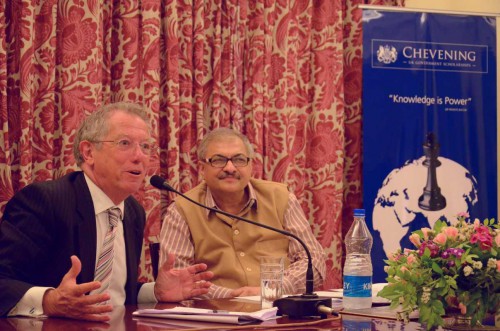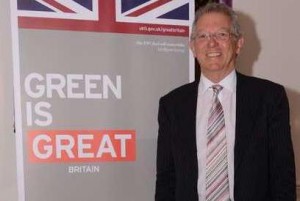7th May 2013 New Delhi, India
Streets ahead – how will our future cities look?
No-one really knows what the future holds, but the reality now is that our urban spaces are overcrowded and polluted. India is rapidly urbanizing. From 1991 to 2011, the urban population in India has increased from 100 million to 200 million. By 2041, 50-percent of India’s population is expected to live in cities. On average, the population of India’s six major metropolises nearly doubled between 1981 to 2001; while the number of motor vehicles went up 775 % during the same period. It’s pretty clear India will need to find solutions to the current and upcoming urban challenges in order to guarantee long-term benefits for its economy, as well as society.
To reflect on the above issues, the British High Commission and ICLEI South Asia co-organised an inspiring Conversation with Sir David King on the issue of ‘Future Cities’ as part of the Chevening lecture series. The discussion attracted a diverse group of leaders from business, international and development agencies, research institutions and NGOs based in Delhi.
 Sir David King, former UK Government’s Chief Scientific Adviser, used the recent launch of the Future Cities Catapult programme in the UK to delve more deeply into the issue of ‘Future Cities’, in a stimulating conversation with Prof. Chetan Vaidya, Director of School of Planning and Architecture, formerly the Director of National Institute of Urban Affairs and urban planner with over 30 years of experience. Sir David explained how the focus must be on the future, as we need to plan now what will be happening in the next 30-50 years, if we want to ensure a sustainable growth. Foresight, explained Sir David, is not about predicting the future but it is about painting visions for it, and work towards achieving them.
Sir David King, former UK Government’s Chief Scientific Adviser, used the recent launch of the Future Cities Catapult programme in the UK to delve more deeply into the issue of ‘Future Cities’, in a stimulating conversation with Prof. Chetan Vaidya, Director of School of Planning and Architecture, formerly the Director of National Institute of Urban Affairs and urban planner with over 30 years of experience. Sir David explained how the focus must be on the future, as we need to plan now what will be happening in the next 30-50 years, if we want to ensure a sustainable growth. Foresight, explained Sir David, is not about predicting the future but it is about painting visions for it, and work towards achieving them.
The Future Cities Catapult programme, hosted in London, is based on a holistic approach, mirroring the need to look at and manage the different areas a city works in (transport, water, buildings and so on) in an integrated way. The programme, currently funded by the UK government, will work with mayors, town planners, utilities etc. around the world, to find ways to shape and build sustainable cities, showing how this can happen respecting the environment and at the same time improving human well-being. It will serve as a hub where all the knowledge relevant for cities will be collected and shared, and will test innovative business solutions in a series of large-scale demonstrator projects – Glasgow, UK, being the first pilot city. 
When asked what the main challenges of Future Cities are, Sir David raised the issue of the buy-in of citizens and how to communicate sustainability to them, using as an example the need for high-density urban areas. Whereas high-density is a crucial requisite for a sustainable city, with urban spaces built for pedestrians and bikes and no need for private cars, such condensed land use still finds a lot of resistance on the citizens’ side.
Sir David also highlighted how, despite the different framework conditions in which British and Indian cities function, mutual learning is possible and wished for; he is looking forward to draw inspiration from the Indian Government’s plan to build seven new smart cities, each home to at least two million people, between Delhi and Mumbai as part of the Delhi-Mumbai Industrial Corridor (DMIC).
Our team at the UK Science & Innovation Network (SIN) in India are partnering with Creative Industries Knowledge Transfer Network Design SIG (CIKTN) for a 12–18 month project driven from UK and India to explore the role and value of design in future city development. If you have an interest in participating in the Indo-UK workshop on ‘Role of Design in Future Cities’ or views on the ‘future cities’ generally do connect with us by leaving a comment below.
Accommodating the expanding population and providing basic infrastructure, and services requires greater urbanisation. However there are issues beyond technology, research or knowledge transfer that would hamper the process. Indian society at large will have to organise better, eradicate the historic inequalities based on class, caste, ethnic and sectarian lines, and corruption, also be willing to change and adapt. Population control would also need to be taken seriously as land, water, and energy/mineral resources are depleting fast and there is no automatic right for developing societies for profligate consumption. People will have to start paying the real price of their profligate lifestyles.
Hi, I would be interested. Please notify me
The Indian urban landscape could be defined as a bizarre ad-hoc juxtaposition of suburbs, gaons, hills, slums and shanty areas, clutters of guthewari structures – which have turned into densely populated squalid habitats – surrounded by glittering buildings and gated communities. Making such cities sustainable is daunting task for all stakeholders. Sustainability, when applied to the context of cities, has dimensions which are constantly being shaped and reshaped by the interaction of global, natural and human systems and forces. I am glad that UK government taken initiative to explore the role and value of design in future city development.
I would be interested in participating in such initiative. In his visit to Pune Sir James David Bevan told in media that feasibility study of Pune Banglore corridor could be done. Please let me know details of Indo-UK workshop on ‘Role of Design in Future Cities’. Being researcher in the field of sustainable cities I am interested to contribute.
Prof. Pratap Raval
UKIERI Scholar
Pune
Dear Prof Rawal
Many thanks for your comment, and glad you liked the blog. Currently, we are scoping out the objectives of the workshop to be held in end-2013. We will keep you posted as the agenda develops, in the meantime, should you have any comments on who should participate from India or any relevant publication on the subject, do share it with me at – leena.arora@fco.gov.uk.
Regards,
Leena
Hi Leena,
I am an Environmental engineer by training and currently work at Department of Hydrology, IIT Roorkee. I have been involved in research related to water and waste management in urban setting. I am also shortly going to visit UK under UKIERI exchange program to develop collaboration in the fields of sustainable stormwater and wastewater management. I will like to participate in any worthwhile activity in this regard and learn/contribute to the extent possible. Please include me in your group and let me know about any further developments.
Regards
Dear Dr Joshi
Thanks for your comment. The workshop is scheduled to be held in end-2013 in India. I shall keep you posted as the date and the agenda firms up. Good luck for your visit to the UK.
Regards
Leena
I am interested in the workshop. I am a Principal Research Scientist at Center for Study of Science, Technology and Policy, Bangalore. We are a multidisciplinary team working on urban development, energy, infrastructure and also emergency management- stressing the need for a holistic look at sustainability for cities of the future.
I would be really interested in being part of the this group.
Thanks
Sujaya Rathi
Dear Sujaya
Many thanks for your comment. It would be useful if you could share details of your work, it sounds very interesting! Could you please email me at – leena.arora@fco.gov.uk.
We will keep you posted on the developments at our end.
Regards
Leena
Densely populated urban spaces depend on task-oriented systems and innovation for delivery of necessary services to sustain functions and well being of citizens. The collection of complex configurations that run the built environment, developed and adjusted over long periods of time, due to population growth, continue to confront ecological balance and increasing demand for depleting natural resources, stretch capacity of existing capital infrastructural assets whilst presenting major obstacles in resource management.
The task ahead is by no means simple. As we move from a dialog on sustainability, towards discussions which address near future scarcity; research methodology, design methods and tools for defining, abstracting, modelling required analysis remain incomplete. As well, the current economic climate, broken dialog and fragmented efforts among stakeholders continue to harbour reluctance towards major investment in necessary upgrades to insure planning for a new architectural order as well as fresh typologies with embedded resilience, interoperable supply systems, efforts towards conservation of biodiversity, promotion of sustainable practice by industries and further encouragement of sustainable behaviour in communities.
TSB is in a unique position to format interdisciplinary conversations and connections on sustainability in the built environment that lead to new knowledge, based on an open dialog which forms frames of reference, through dissemination of existing academic research and available private sector as well as NGO initiatives for structured knowledge transfer and collaboration among likeminded bodies which may lead to strong deliverables and disruptive innovation.
A number of interrelated concerns with direct impact on community needs, governments and private companies, in conjunction with range of social, economic as well as environmental objectives can be addressed at various scales to test interoperability as well as diverse innovation through use of available, yet underutilised technologies, for urgently needed adjustments in city systems, simultaneously and systematically, for a long-lasting legacy.
Thank you very much for your comment Yonca, and I’m glad you like the post. I thought you would be interested to know that a Future Cities Special Interest Group has now been established on _connect to explore the challenges and opportunities around shaping the urban environment for future generations in cities. If you have not already, I strongly recommend that you join the group.
Best wishes,
Leena
I would be interested in participating in the Indo-UK workshop as I have a project in India already, am PI on the Sustainable Society Network+ for Digital Economy Program and work extensively on digital and sustainable, smart cities.
Hi Catherine
Thanks for getting in touch, and glad you are interested in the ‘design and future cities’ project. I’ll contact you offline so we can discuss the project in detail. If you have not already, you might find it useful to register yourself at the Future Cities Special Interest Group at the TSB’s website.
Best wishes,
Leena